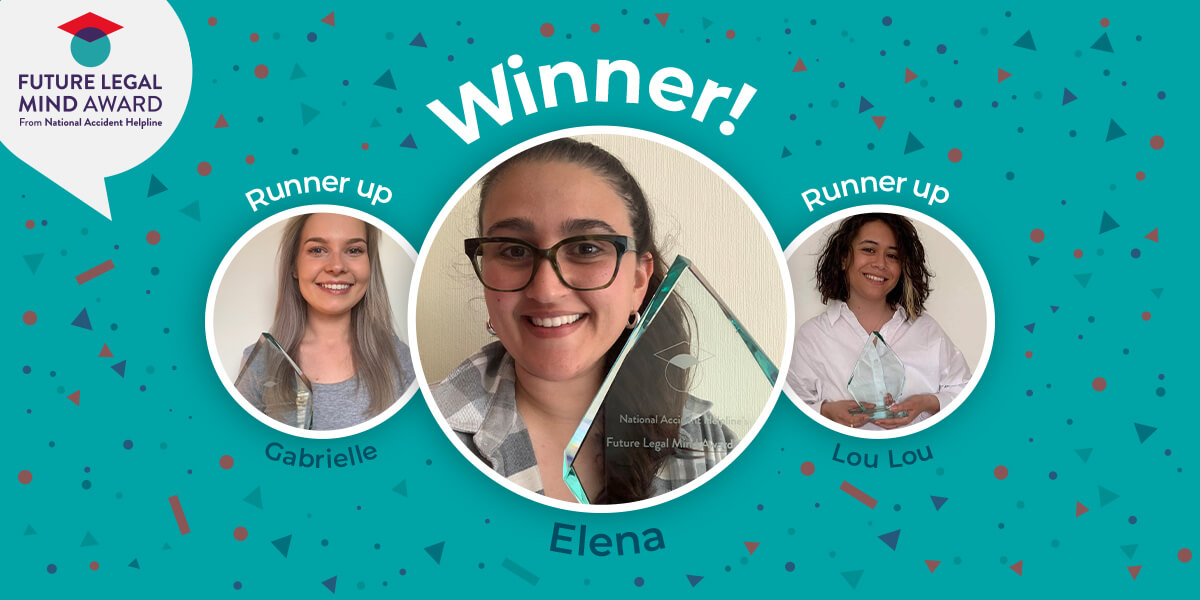
Our Future Legal Mind 2021 winner was Elena Michael, while Gabrielle Butler and Lou Lou Curry were named as runners up.
The essay question
For our 2021 competition, we asked entrants to write an essay responding to the question:
Achieving a qualification in law provides a great foundation for careers today.
Tell us about why you chose to study law and which area of the law you feel most passionate about.
Is there an area of the law or UK legal system which you think is broken and requires urgent reform?
Our 10 finalists delivered excellent essay submissions focusing on a broad range of legal sectors. They were asked to support these by each sending in a short video, which can be watched below.
Prizes
As the competition winner, Elena received a £2,000 prize fund, while Gabrielle and Lou Lou each received £250.
All three have the opportunity to take part in mentoring sessions with two of our competition judges, Jonathan White and Adam Nabozny both of whom are experienced lawyers within our team.
We look forward to continuing to support and champion them in their careers over the years ahead.
Our judges' verdict
Joining Adam Nabozny and Jonathan White on the judging panel for the first time this year was Will Herbertson, our Director of Marketing and Strategy.
The judging panel were hugely impressed by the quality of essays and videos submitted by 2021's finalists.
In this video, they give an overview of the 2021 competition and tell us what stood out to them about the winner and runners up.
Future Legal Mind 2021: Our finalists
WINNER: Elena Michael
When she was named our Future Legal Mind 2021, Elena, who is from Barmouth, Wales, was about to complete her Bar practice course at BPP University.
Alongside her studies, she provided consultancy for children whose own studies were impacted by their mental health and worked as an Applied Behaviour Analysis therapy administrator for children.
After finishing her course, Elena was planning to turn her attention back to #NotYourPorn - a campaign that she co-founded to fight for the removal of non-consensual content from UK porn sites.
She referenced #NotYourPorn in her entry and argued that the Law Commission's latest proposals to expand the range of digital sexual crimes in the UK and other plans for reform in this area do not go far enough.
Watch Elena's video:
RUNNER UP: Gabrielle Butler
Gabrielle, a law student from Shifnal, Shropshire, was coming to the end of her first year at the University of Cambridge when she was named our joint runner up.
An aspiring solicitor, in her entry, she argued that the law needs to be reformed to provide better access and justice for women who have experienced sexual violence.
Watch Gabrielle's video:
RUNNER UP: Lou Lou Curry
When Lou Lou was named as a runner up, she was working as a paralegal and case worker for a criminal defence firm, and finishing her LLM Legal Practice at BPP University.
In her essay, she argued that the law needs reforming to change the difficult burden of proof facing LGBTQ+ asylum seekers. Her ultimate ambition is to become a barrister, providing advocacy for a diverse range of clients.
Watch Lou Lou's video:
Finalist: Edeh Gharibi
Edeh entered the competition when she was in the second year of her law degree at Cardiff University.
In her entry, she argued that current legislation in the UK does not protect people facing multiple forms of discrimination, and her passion for reforming certain aspects of discrimination law shone through.
Watch Edeh's video:
Finalist: Bevan Mariadas
When he was named as a finalist, Bevan was completing the Bar course at the Inns of Court College of Advocacy.
Having previously worked as a paralegal in the NHS, Bevan felt strongly about the issue of clinical negligence and outlined the need to change the criterion for psychiatric injury claims.
He hoped to become a barrister working in clinical negligence, personal injury and inquests.
Watch Bevan's video:
Finalist: Nnemdi Ozoemena
An aspiring human rights solicitor, in her entry Nnemdi focused on the issue of non-consensual adoption within family law and called for laws in this area to be reformed.
When she was named as a finalist, Nnemdi, from Borehamwood, was in her second year studying law at Durham University.
Watch Nnemdi's video:
Finalist: Angela Pober
Angela wrote about her experience of being accused of aggravated trespass on her own land and how she hoped to provide “accessible legal representation” to those “who feed the nation”.
A non-law graduate, Angela was living in Cornwall and made the transition into legal study in 2020 when she started studying online with the University of Law for a Graduate Diploma in Law.
See Angela's video:
Finalist: Shakira Schofield
Shakira argued that the Suicide Act 1961 needs reforming to remove the criminal penalty for assisted suicide.
Entering the competition when she was in the second year of her Law with Criminology degree at the University of Salford, Shakira aimed to become a solicitor working in either criminal, public or EU law.
See Shakira's video:
Finalist: Calvin Williams
Calvin, was working for Withers & Rogers LLP, and studying remotely for a Postgraduate Certificate in Intellectual Property at Bournemouth University, when he entered Future Legal Mind.
A budding patent attorney, in his role he assists with the prosecution of patents. In his entry he outlined how there are many examples of non-patented matter that are “not served well enough” by copyright law.
See Calvin's video:
Finalist: Keely Wright
In her entry, Keely, focused on wrongful convictions and outlined how she believed that laws in this area are governed by “counterproductive and contradictory measures” that are in need of urgent review.
She was preparing for her law degree finals at The University of Greenwich when she was named a finalist.
Watch Keely's video: